Socialism in Venezuela: Why is there a shortage of money if there is inflation?
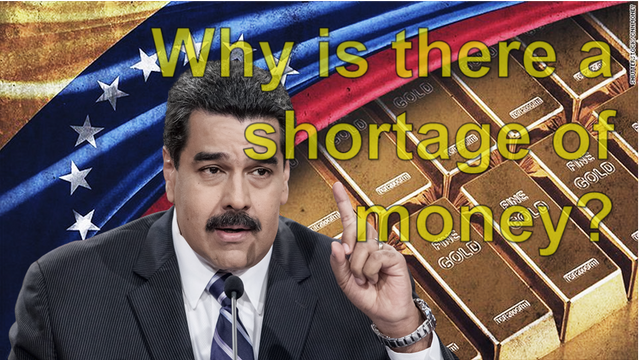
How many times do we hear about inflation in the news? whether on the Internet, TV, radio or in the newspapers, we always find discussions on this topic, mainly if issues on politics or economy are discussed, despite this, most people don't give due importance to this topic, and the possible negative consequences that the inflationary measures could have in the pocket of each one of us.
Inflation is constantly associated with a lot of money of little value in circulation. We have all seen the famous photograph taken in the 1920s in Germany, where some children play with paper currency blocks due to the hyperinflation suffered by the economy of the Weimar Republic.
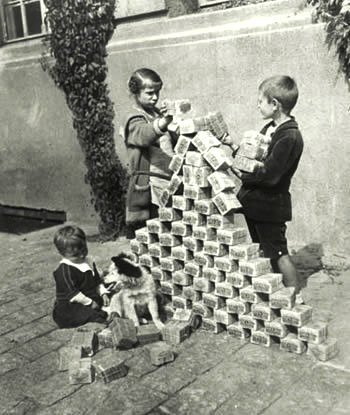
Well, Venezuela is currently suffering the same problem as the Germany of the twenties. When inflation increases, prices rise, making people increasingly need money to carry out commercial transactions, and if the inflation problem reaches a critical state, people will be forced to use tens or hundreds of bills of the highest denomination to pay a cup of coffee or public transport.

However, what is happening currently in Venezuela is a very peculiar situation, since there is a high rate of inflation but there is also a shortage of cash, and that is exactly what I am going to try to explain in this publication.
In 2007, the government of the then president of Venezuela, Hugo Chávez, decided to carry out the process known as "Monetary Reconversion", by which the last three digits of all the bills were deleted, and all the balances in the bank accounts were similarly converted, in this way, 1,000 bolivars became 1 bolivar, 10,000 bolivars in 10 and 50,000 in 50.

This process had two main objectives; the first was to simplify commercial transactions, both individually and at the level of banking systems. The second objective was to anticipate inflation, decreasing the figures and changing paper money together with manufacturers to favor the practices used by the government and the Central Bank. However, things did not turn out as expected by the government.
Before continuing, and explaining definitively why there is a shortage of cash, I will pause to explain as quickly as possible what inflation is and how it works.
What is inflation?
Inflation is the excess of money supply, so simple, if there is more money in circulation than the one demanded by the suppliers of goods and services, inflation is generated. The main sign that an inflationary economy presents is a general increase in the prices of goods and services. In your country do the prices of the products increase? If the answer is yes, then their economy is inflationary.
Let's see, in the image below I tried to illustrate the possible scenarios that an economy presents with respect to the inflationary problem, drawing a line that separates the deflationary* scenarios from the inflationary ones, divided by a point of balance. The farther they are from the balance point, the higher is inflation or deflation, which is why there are economies with more inflation than others.
*Deflation: the opposite of inflation, since it is the shortage of money supply, causing prices to fall instead of rising.

Scenario No. 1: A highly deflationary economy is presented as the quantity of goods and services increases while the money supply decreases.
Scenario No. 2: A deflationary economy is presented as the money supply decreases. Next to scenario number 1, it is possibly the case of the most difficult occurrence, since it would be rather strange that the money was consumed.
Something like that?
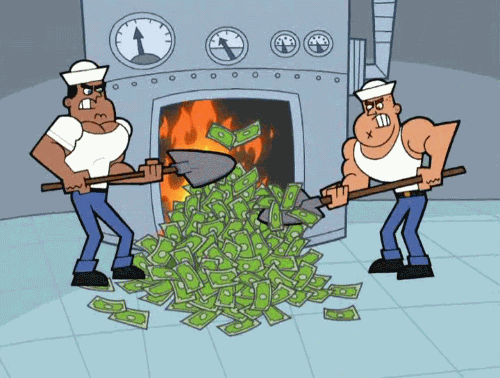
Scenario No. 3: A deflationary economy is presented because the increase in available goods and services makes the money supply less than the demand for money.
Scenario No. 4: An economy in balance is presented, the money supply is equal to the demand for money, inflation and deflation are zero, and prices remain stable.
Scenario No. 5: An inflationary economy is presented, since the money supply exceeds the quantity of goods and services available. This is the most common scenario, because almost all the economies of the world maintain a central issue of money.
Scenario No. 6: An inflationary economy is presented because the quantity of goods and services available decreases. It occurs in a crisis economy, where industrial production enters a state of recession.
Scenario No. 7: A highly inflationary economy is presented because it increases the money supply, and in turn decreases the amount of goods and services available. This type of scenario is presented in Venezuela.
Then, making clear what inflation is and the different scenarios in which it is presented, we know that the only responsible for it is the money issuer, not you, not me, but the money issuer, be the Central Bank of your country, the Federal Reserve, the European Central Bank, the Parliament, the President, or in the case of cryptocurrencies, mining.
Well, going back to the previous topic, after Venezuela carried out the "monetary reconversion", that is, suppressing the last three digits of its local currency, the price of oil began to fall and because Venezuela is highly dependent on oil, inflation began to increase.
In this graph you can see the fall in the price of the oil barrel after 2012.
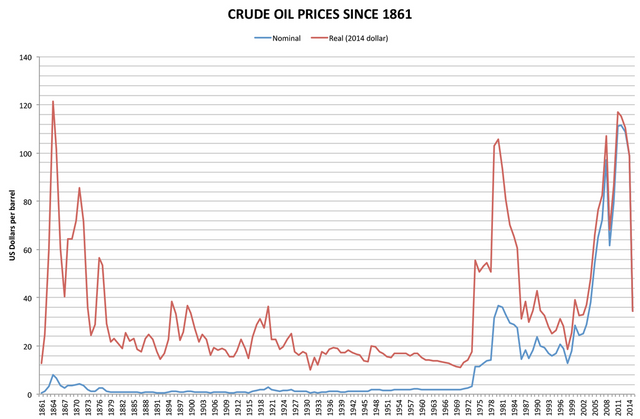
In this graph you can see the acceleration of inflation in Venezuela after 2012.

This event makes Venezuela, a nation highly dependent on oil revenues, placed on scenario number 7.
Scenario No. 7: A highly inflationary economy is presented because it increases the money supply, and in turn decreases the amount of goods and services available.
Although the price of oil began to rise in the last two years (2016-2017) Venezuela continues to present the same inflationary problem, due to the fact that its debt has increased exponentially and its oil production began to fall.
The following graph shows the decrease in oil production in Venezuela.

Well, I like to leave this whole thing clear, mainly because there are two theories about the inflationary crisis in Venezuela.
The first is mainly the one I have explained so far, evidently under my personal analysis, because each economist has a different explanation of the matter, but most of them agree with me that the main problem is the poor monetary policy of the Central Bank of Venezuela and the decline of production.
The second theory is the one alleged by the socialist government of Venezuela, which accuses the US government of leading an economic war against Venezuela, with the aim of destabilizing the economy. I would really like to explain this theory to you, but it really is a theory without arguments, not even the government has explained, economically, how this war develops. The arguments that the government gives are basically the following:
1. Oil fell because the United States caused it to fall to hit the Venezuelan economy.

Despite these accusations, Venezuela has not stopped selling oil to the United States, which, by the way, is the only one among all the buyers who currently pay for oil.
2. President Obama declared the country a threat to the United States and President Trump decreed economic sanctions to hang the people of Venezuela.
Despite Obama's decree, no Venezuelan company has been expropriated or interfered in any way on US soil, and despite the sanctions issued by President Trump, Goldman Sachs bought $ 2.8 billion in bonds from the Venezuelan government. The only thing that prevents sanctions is that the Venezuelan government continues to be indebted to US banks, all kinds of trade is still permissible.
3. Venezuela is attacked from Miami by the parallel dollar (illegal market dollar) to destroy the national currency.
The parallel dollar or also called the black dollar, is the result of a set of economic measures of monetary control established by the government of Chavez and Maduro, through which the State of Venezuela became the only supplier and demander of foreign currency (mainly Dollars). Due to the scarcity of dollars, the government was forced to ration allocations of foreign currency, so people go to a clandestine market where the exchange rate is much higher. The main place of exchange is on the border with Colombia, where a market with very specific characteristics is generated, since there are many Venezuelans crossing the border and changing their bolivars for pesos, using as reference a dollar rate established by the offer and the demand, causing the Venezuelan currency to lose a lot of value, however, the worst part is when a website called Dolartoday.com decides to report the bolivar/dollar exchange rate taking as a main reference the dollar in the border with Colombia, and due because in Venezuela the price system and the market information channels don't work properly because the government monopolized the money market, Dolartoday.com's exchange rate was assumed by all foreign currency traders, which hurts to the economy, because it is a rate of change that does not represent the macroeconomic dimensions of the Venezuelan economy. So, evidently this does harm the economy, but it is a problem caused by a deficient monetary control established by the government.
4. The Colombians rob us across the border.
The only thing that goes across the border through Colombia today are hundreds of thousands of Venezuelans fleeing from socialism.
Then, leaving established the arguments of the government, we can understand that the facts undoubtedly indicate that inflation increases at an accelerated rate mainly because the production of goods and services decreases, and the money supply increases, nested to that there is a problem of devaluation against the dollar that helps inflation increase. All this caused the new monetary cone to lose value, it was then, when at the end of 2016 the government decided to take out of circulation the highest denomination bill (100 bolivars).
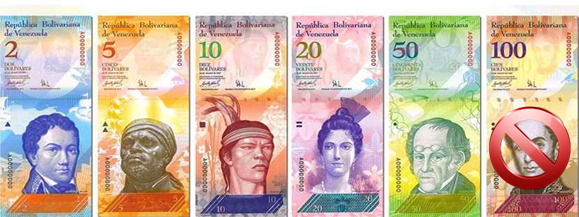
That generated a lot of problems because the people lined up to change their cash, since that was practically the only bill with relative value, since the rest of the bill had been disused due to their low value. However, at present, this bill is still used for commercial transactions, since the government has made consecutive extensions month after month, because it has not been able to remove them from circulation.
Well here is where the problem of the shortage of money really begins, because almost all the printed money had lost value, and therefore all possibility of practical use, the government was forced to expand the monetary cone including bills of 500, 1,000, 2,000, 5,000, 10,000, 20,000 and the most recent of 100,000 bolivars.
Note: If the government was not made the monetary reconversion in 2007, we would be talking about a bill of 100 million bolivars today.
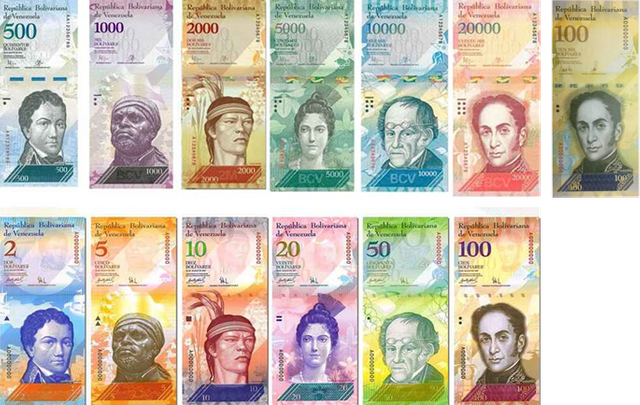
By the way, if you notice that the bills resemble each other, it is because the government only slightly altered the colors, since for practical reasons they could not afford to make new ones. If you look closely, the 100,000 bolivars bill is identical to the 100 bolivar bill that they tried to take out of circulation.
Well, it should also be said that the highest denomination bill (100,000 bolivars) is equivalent to 0.44 cents, so the manufacturing and distribution process may be much more expensive than the bill.
Due to the shortage of the new banknotes that were put into circulation since 2017, banks were forced to establish maximum amounts of daily withdrawal, in such a way that Venezuelans can only acquire between 10,000 and 20,000 bolivars per day, that is, between 0.04 and 0.08 cents.
However, most people wonder why there is a shortage of money if there is inflation? If you remember the picture of the children in Germany that I placed at the beginning of the publication, you can keep in mind that the money should abound. However, it is not like that anymore.
According to the government, a group of conspirators systematically exchange US dollars and Colombian pesos for bolivars, with the objective of keeping the Venezuelan cash and taking it to Switzerland or some European country, in order to hit the Venezuelan economy and overthrow the government.

Hahahaha, don't you believe in conspiracies of this kind? Well then you may prefer to accept my conclusion...
Money is scarce in Venezuela because of the constant increase in the prices of products, since inflation has left the entire the paper money that was in circulation without value, making the little money with value still in circulation be monopolized by few hands, because every time more money is needed to buy the same amount of products. If two or three years ago a Venezuelan paid public transport with a single bill with a value of 20 or 50 bolivars, today he needs around 30 or 40 bills with a value of 100 bolivars to carry out the same operation, that is, more bills, but because the monetary issue has been made through deposits and not through the printing of paper money, money has become scarce.

I read a part of it, but already knew the answer before:
Strict answer is that there is no shortage of cash as a hole, only the public has a shortage.
Elaborated answer is that the reason for Venezuela's, Weimar's, Zimbabwe's and Argentina's is that their debts were in another country's currency.
In Venezuela's case, it enjoyed a tide that floated all boats in oil prices.
However, Venezuela's oil is of low quality and expensive to pump, and it needs US' "sweet crude" oil in order to dilute its own oil prior to distilling/refining it, so Venezuela also has to import oil priced in USD.
Correct, but the main problem is that the money supply is increased at an accelerated rate but only at the level of deposits and not paper money, which means that there is a lot of inflation but little money in cash.
This comment has received a 50.00 % upvote from @steemdiffuser thanks to: @stimialiti. Steem on my friend!
Above average bids may get additional upvotes from our trail members!
Get Upvotes, Join Our Trail, or Delegate Some SP
https://steemd.com/tx/8669cb71963a672d39bb3af7b43f15a7789bf6ce
This comment has received a 50.00 % upvote from @steemdiffuser thanks to: @stimialiti. Steem on my friend!
Above average bids may get additional upvotes from our trail members!
Get Upvotes, Join Our Trail, or Delegate Some SP
You got a 100.00% upvote from @greengrowth thanks to @stimialiti! You too can use @GreenGrowth by sending your post URL in the memo field to the bot. Minimum bid is 0.01.
If you feel this post is spammy or not worthy of @Greengrowth you can contact a moderator in our Discord Channel https://discord.gg/6DhnVTQ.
You got upvoted from @adriatik bot! Thank you to you for using our service. We really hope this will hope to promote your quality content!
Great post! You've earned a 16.66% upvote from @dolphinbot
You got a 8.00% upvote from @adriatik courtesy of @stimialiti!
I have no idea about the financial system... but I cannot understand how a governance can only delete a few 0 of a bill in the opinion, that it can stop an inflation? Isn't this absolutely stupid? That doesn't solve any of the 1000 problems while an inflation.. just burns a lot of money to create new bills and switch it in the economy.. 😫😡
Please correct me if my opinion is not right at all...
Correct, as I said eliminating some 0 from paper money would not reduce inflation at all, they just did it for practical reasons.
Coincidence! It seems that the government has just announced today that it will once again make a monetary reconversion and remove the 3 zeros again.
I cannot believe this 😡
Curated for #informationwar (by @openparadigm)
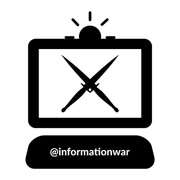
Relevance: The Economics of Socialism
Our Purpose
Very in depth post. Just like every other fiat currency, the numbers on balance sheets exceed physical note supply by a vast amount, hence a shortage in the streets of physical notes.
I think you will find the story of Leo Wanta interesting:
http://www.rense.com/general70/leo.htm
Unfortunately for Venezuela, they leveraged themselves (and the economy) up at a time when the US was taking shots at Russia via the oil price - which dominates Russia's GDP. Venezuela has been caught in the cross hairs and seeing their communist tendencies (aka socialist) it's no surprise that the US has taken a disliking to Maduro and crew.
Yes, they leveraged, the unusual thing about this problem is that there was a shortage of money in cash when there was inflation, something that does not happen very often. This happened because they do not have the ability to print bills at the same rate that inflation increases.
By the way, interesting story of Mr. Wanta, I will investigate more about it.
Interesting situation sitaution ongoing in Venezuela. The problem their facing has the some aspects of deflation but also some aspects of inflation.
Yes, it is true that the shortage of money could bring inflation, the problem is that it is still issuing new money through deposits.
That will eventually spiral out of control and it will cause hyperinflation correct if I am wrong.That would interesting sight to see when some takes like one million bolivars or so from the atm.
Yes, currently Venezuela could already be said to be in an almost hyperinflationary state, but for now ATMs can only emit between 10,000 and 20,000 bolivars per person. I think the government wants to limit the amount of money that may be in circulation for inflation to slow down, because if there were no such limit in the ATMs, people would get 1 million in cash easily.